Hong Kong protesters surprise with tactical victory
October 14, 2014 -- Updated 1753 GMT (0153 HKT)
STORY HIGHLIGHTS
- NEW: Protesters retake a key road in a surprising strategic victory
- NEW: Some demonstrators and police brawl
- Democracy campaigners have been blocking key routes through the city
- C.Y. Leung: Protests a "mass movement that has spun out of control"
Hong Kong (CNN) -- Pro-democracy protesters in Hong Kong began Wednesday with a tactical upper hand, having successfully retaken a road outside government headquarters.
The demonstrators "are not afraid of anything," said Lo Cheong, 62, who is one of them. "Ask them if they're afraid of bullets. They're not. This is our last chance. We know we're most likely going to fail, but we have to try."
Retaking Lung Wo road was necessary "to protect the protesters," said a demonstrator named Bon.
The crowds reoccupied the road late Tuesday after battles with police who tried to block them. Authorities deployed a team of riot police with masks, batons, and pepper spray. Police ran through a tunnel to reach the protesters. But the protesters managed to flank the police, surrounding them inside the tunnel.
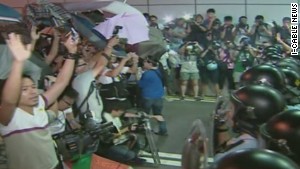
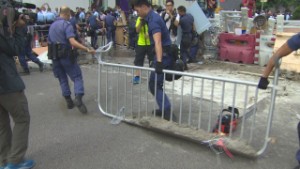
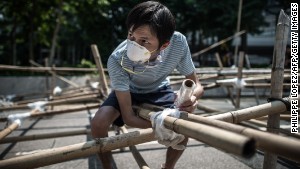
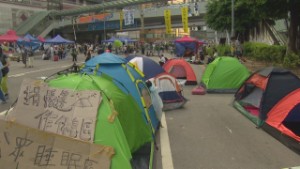
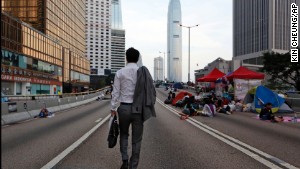
CNN saw some protesters hit by batons and shoved by police, and at least one person pepper sprayed. The demonstrators defended themselves with rows of umbrellas.
After a 30-minute standoff, police were forced to retreat -- leaving protesters cheering loudly and pumping fists into the air.
The protesters then set up new barricades to keep the road.
Earlier, police had dismantled the barricades, cutting ties used to bind together metal fences, signs, wooden pallets and recycling boxes blocking traffic through Admiralty, a main thoroughfare in Hong Kong.
There was no sign of resistance as officers loaded the barricades onto waiting trucks.
Pro-democracy campaigners have camped out in the area for more than two weeks as they push the government to change the way elections will be run in 2017.
On Monday, scuffles broke out as a group of protest opponents rushed the site and tried to pull down the barricades. They could be heard yelling at protesters, accusing them of damaging their livelihoods.
Police intervened by forming a human chain to keep the two sides apart. Eventually the protest opponents retreated.
Protest disruption
At the peak of the protests, which started in late September, tens of thousands of demonstrators crowded onto the streets demanding a greater say in how the city is run.
Protesters have been guarding barricades erected at the protest sites, and for many nights slept in the open air on the asphalt before the arrival of reinforcements with tents.
Traffic in the other parts of the city has been clogged due to road closures, bus and tram cancellations and the need for cars to drive around the protest sites. Taxi drivers say their takings are down, and businesses claim the protests have cost them income.
While protest numbers dwindled toward the end of last week, they started building again over the weekend when protest leaders called for reinforcements after the government called off talks planned for Friday.
First live address
Over the weekend, Hong Kong Chief Executive C.Y. Leung made his first live address since protesters blocked key routes through the city. Speaking on local free-to-air station TVB, Leung said the protests were not a "revolution," but a "mass movement that has spun out of control."
He said student leaders had "almost zero chance" of pushing Beijing to change its stance on how Hong Kong's leader is elected. He added he would not submit to the protesters' demands that he resign, because his resignation "will not solve the problem."
"It is because the students and other occupation protesters demand more than that. They want the Standing Committee to withdraw its August 31 decision. That is impossible," he said.
Beijing white paper

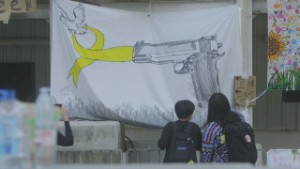
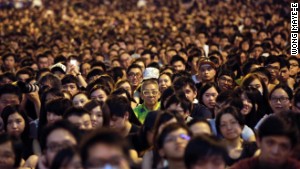
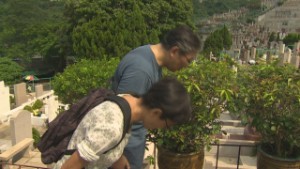
He was referring to the white paper issued by the Standing Committee of China's National People's Congress stating that Hongkongers would be able to vote on their leader in 2017, but only from an approved shortlist of candidates.
In response to Leung's comments, the three main groups leading the occupy campaign said it was the government that was out of control -- "a government that fires tear-gas at unarmed citizens and unilaterally terminated dialogue with the students (sic)."
On September 28, police fired 87 tear gas rounds into the crowd after protesters failed to disperse. The move was seen as a miscalculation and only served to garner support for the protesters, who accused the government of heavy handedness and of stifling free speech.
Open letter to China
Over the weekend, student leaders from the protest group Scholarism and the Hong Kong Federation of Students wrote an open letter to Chinese President Xi Jinping, urging him to closely consider their cause.
"There will only be more citizens, disillusioned with our corrupted institutions, marching and protesting, as long as no genuine democracy is practiced in this place," they wrote.
The letter said the occupation was "definitely not a colour revolution or its alike, but rather a movement for democracy," referring to the term "umbrella revolution" which was coined after protesters used umbrellas to shield themselves from pepper spray and tear gas.
View from China
Xi has not commented on the protests, but Chinese censors have been busy blocking reports of the movement, including access to the photo-sharing site Instagram.
A commentary published in China's state-controlled People's Daily on Monday, entitled "Why is the U.S. so keen on Color Revolutions?",accused the United States of meddling in Hong Kong affairs.
"It is hardly likely that the U.S. will admit to manipulating the 'Occupy Central' movement, just as it will not admit to manipulating other anti-China forces. It sees such activities as justified by 'democracy,' 'freedom,' 'human rights' and other values," it said.
It said the mainstream U.S. media had shown "exceptional interest" in "Occupy Central" and had tried to portray it as Hong Kong's version of a "Color Revolution," referring to pro-democracy movements around the world including the "Arab Spring" and Ukraine's "Orange Revolution."
"The U.S. may enjoy the sweet taste of interfering in other countries' internal affairs, but on the issue of Hong Kong it stands little chance of overcoming the determination of the Chinese government to maintain stability and prosperity," it added.
CNN's Wilfred Chan, Anjali Tsui and Vivian Kam contributed to this report.
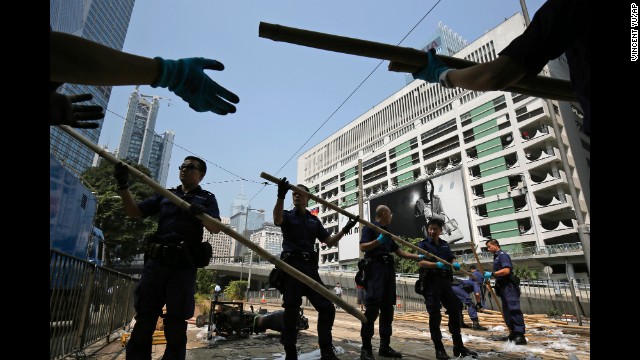 Police remove bamboo that pro-democracy protesters had set up to block off main roads in Hong Kong on Tuesday, October 14. Demonstrators are angry about China's decision to allow only Beijing-vetted candidates to run in the city's elections for chief executive in 2017.
Police remove bamboo that pro-democracy protesters had set up to block off main roads in Hong Kong on Tuesday, October 14. Demonstrators are angry about China's decision to allow only Beijing-vetted candidates to run in the city's elections for chief executive in 2017.
No comments:
Post a Comment